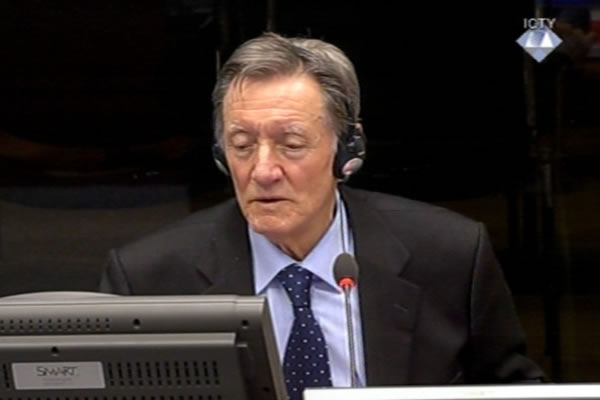Home
SARAJEVO WOULD HAVE BEEN ‘ASHES AND DUST’ HAD IT NOT BEEN FOR GENERAL MILOSEVIC
In the cross-examination, the prosecutor brought up the evidence of numerous witnesses who had already testified at Karadzic’s trial that the Bosnian Serb fired on Sarajevo indiscriminately; as a result, no building was left intact. Had his corps attacked the city without any control, General Dragomir Milosevic replied, Sarajevo would have been turned to ‘ashes and dust’
 Dragomir Milosevic, defence witness of Radovan Karadzic
Dragomir Milosevic, defence witness of Radovan Karadzic Despite ample evidence, including documents produced by the Bosnian Serb army, about the deliberate targeting of civilians in Sarajevo, former commander of the Sarajevo-Romanija Corps (SRK) Dragomir Milosevic remained adamant that his artillery and snipers never targeted anything else but the BH Army positions. So far in his evidence as a defense witness of the former Republika Srpska president Radovan Karadzic, General Milosevic strove to portray his corps as a professional unit determined to observe international law even at the cost of its own losses. General Milosevic has been sentenced to 29 years in prison for the terror campaign against the citizens of Sarajevo.
Prosecutor Edgerton listed a few incidents in Sarajevo that were already dealt with in other trials before the Tribunal. Among them is the killing of Munira Zametica by a sniper who fired on her from a Serb Orthodox church while she was drawing water from the Dobrinja river, and the murder of 13 and wounding of 14 civilians in a water queue in Dobrinja. The victims were hit by a mortar shell. Both incidents happened in July 1993 when the witness was the chief of staff in the SRK. A year later, Milosevic became the corps commander. The witness said that his soldiers ‘were not allowed to climb on the church’. He ruled out the possibility that they were responsible for the incident. General Milosevic claimed that he didn’t know who fired the shell that hit the people in the water queue.
The prosecutor brought up testimonies of various witnesses, mostly those who had served in the international forces in Sarajevo. The witnesses claimed that during the four years of the siege, the city was under such indiscriminate fire that ‘there were no buildings without damage to windows and walls caused by explosions and shrapnel’. Fire was opened from Serb positions on ‘everything that moved in the city’ and ‘without any military purpose, only to intimidate civilians’, the witnesses claimed. General Milosevic dismissed their claims as lies. Sarajevo would have been ‘turned to ashes and dust’ if fire from his positions had indeed been uncontrolled, the witness said, stating categorically that his artillery was under strict control. General Milosevic saw the witnesses’ testimonies as part of the campaign to ‘vilify’ the Sarajevo-Romanija Corps and portray it as ‘bestial’.
Yet, the very documents of the Bosnian Serb army – some bearing the witness’s signature – state that civilian areas were deliberately targeted. Thus, on 19 July 1995, Milosevic issued a document criticizing his soldiers for ‘frequently firing on inhabited areas although there is no fighting’. General Milosevic’s criticism wasn’t motivated by the violations of the customs of law but by his desire to save ammunition. The witness, however, didn’t see this as an admission that residential areas were indeed targeted. The only thing that could be gleaned from Milosevic’s lengthy and abstruse answer was that in the order he had prohibited ‘pointless fire’.
According to the prosecutor, Milosevic’s order of 6 April 1995 also provided evidence that civilian facilities were intentionally targeted. Milosevic ordered an attack on the center of Sarajevo’s neighborhood of Hrasnica with a highly destructive modified air bomb. Bosnian Serb army reports showed by the prosecutor in court indicate that the BH Army artillery was positioned in the hills around Hrasnica, not in the town itself. The witness nevertheless claimed he had been told there was a mortar battery in the center of the settlement. It had to be neutralized, although the Serb army had shown ‘a great deal of patience’. A day after Milosevic issued his order, a civilian house was ‘neutralized’ by the air bomb; one woman was killed and three other persons wounded.
General Milosevic’s cross-examination continues tomorrow. At the end of hearing, the defense indicated it was preparing to call another of the Tribunal’s convicts, former Drina Corps commander Radislav Krstic. He was sentenced to 35 years in prison for his part in the Srebrenica genocide.
